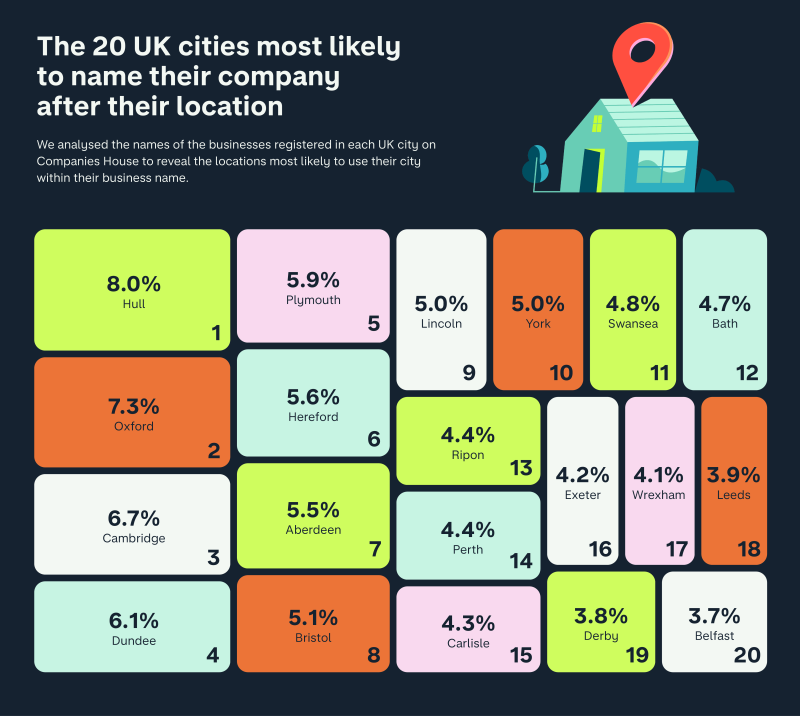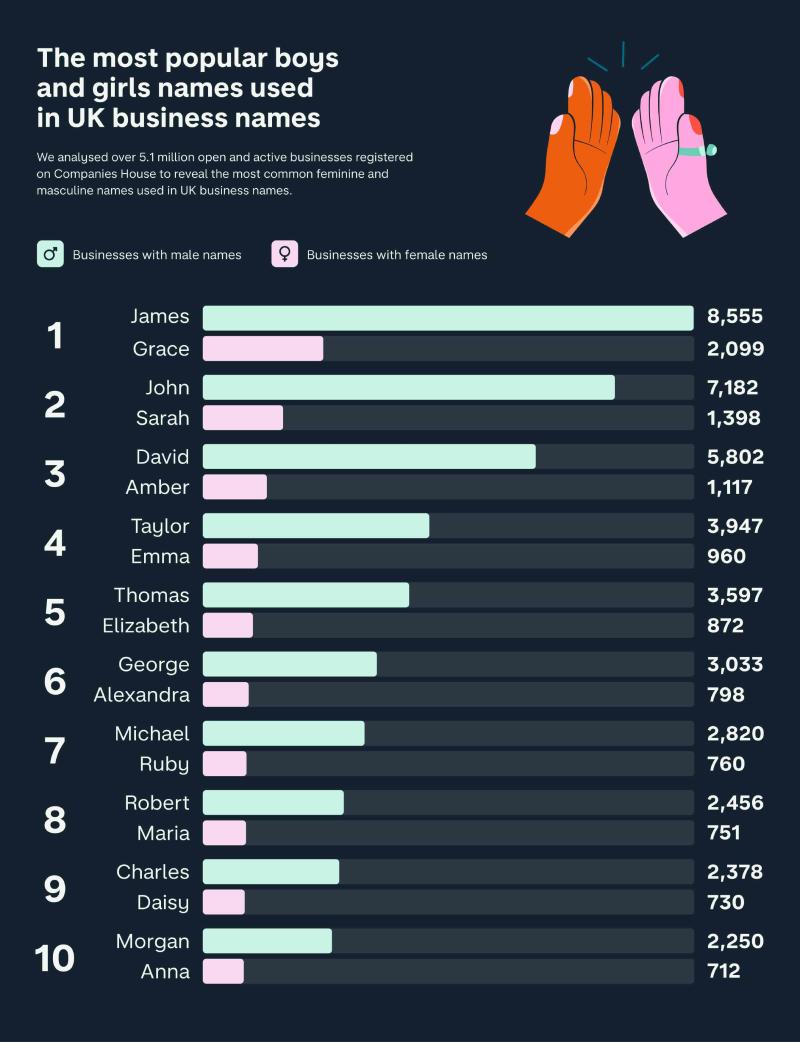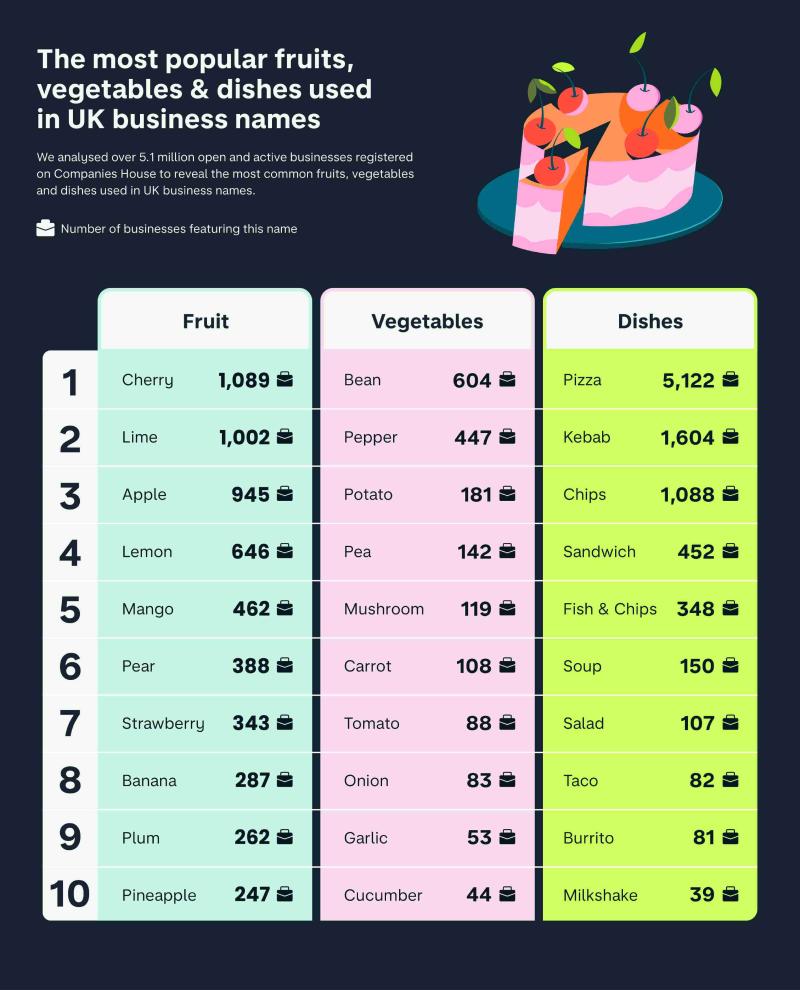
These are the most popular names for UK businesses
If you’re a new business looking for naming inspiration, you’re not alone. There are more than 6,600 Google searches for ‘business name ideas’ in the UK each month. And that’s not surprising, with over 5.5 million registered private sector SMEs in the UK.
Regional pride: ‘Scotland’ is the most common country used in business names
Business owners are proud of where they live, with an impressive 132,958 companies adding ‘UK’ to their name.
‘British’ also appeared in 2,497 business names. But if you want to use the word ‘British’ as the first part of your business name, you’ll need to apply and prove your company is “pre-eminent or very substantial in its field”.
Overall, the Scots top the table with 9,900 companies including their country name.
The number of businesses that use each country's name
| Rank | Name of country | No. of businesses registered in the UK with this country included in its name |
|---|---|---|
| 1 | Scotland | 9,900 |
| 2 | Wales | 2,959 |
| 3 | England | 1,456 |
| 4 | Northern Ireland | 428 |
Hull and Oxford-based businesses reference their city the most

Incorporating a city into a business name can create a sense of local identity and build trust with customers. Of the 14,537 businesses registered on Companies House data in Hull, an impressive 1,159 feature the city in their business name, which is around one in twelve companies.
Oxford takes second place, out of a total of 20,158 businesses, 1,477 feature the city in their business name (7.3%). Cambridge follows in third with 6.7% (1,800 locally registered businesses including the city in its name of the total 26,967).
See how your city stacks up in the full data set here.
James and Grace are the top girls’ and boys’ names

Using a human name can help add a personal touch to your company.
Grace, Sarah and Amber lead the way for women. James, John and David head up the list for male names.
Sons are still the top family relation in business names
Family businesses make up more than 85.9% of all private sector businesses, so it’s no surprise that ‘family’ features in 5,994 UK business names.
Tradition is clearly a strong factor. ‘Son’ is the most commonly used family member name, cropping up 7,679 times. Meanwhile, ‘daughter’ features just 165 times.
The most common family members used in UK business names
| Rank | Name | Number of businesses registered in the UK |
|---|---|---|
| 1 | Son | 7,679 |
| 2 | Children | 733 |
| 3 | Mother | 343 |
| 4 | Brother | 299 |
| 5 | Sister | 202 |
| 6 | Daughter | 165 |
| 7 | Uncle | 163 |
| 8 | Dad | 142 |
| 9 | Mum | 140 |
| 10 | Father | 102 |
‘Management’ is the most likely industry to reference itself
Some industries are much more likely to use a descriptive name that does what it says on the tin.
In the UK, ‘management’, ‘property’ and ‘consulting’ are the most likely industries to feature in a business name.
The most common industries in UK business names
| Rank | Name | Number of businesses registered in the UK |
|---|---|---|
| 1 | Management | 155,485 |
| 2 | Property | 114,022 |
| 3 | Consulting | 81,689 |
| 4 | Construction | 51,483 |
| 5 | Design | 37,685 |
| 6 | Engineering | 35,050 |
| 7 | Business | 27,268 |
| 8 | Media | 25,678 |
| 9 | Transport | 22,944 |
| 10 | Investment | 19,921 |
‘Pizza’ is the most popular food in business names

Food comes up often in business names. And some quintessential favourites, like ‘pizza’, ‘kebab’, ‘chips’ or ‘sandwich’, feature more heavily than others.
But food can also be used to set a tone. ‘Lemon’ can signal freshness, and ‘pepper’ a dash of spiciness.
Fish and dogs are the top animal-inspired names
Businesses in the sports industry often choose animals that represent strength and agility, like ‘Panther Fitness’ or ‘Eagle Athletics’.
But other than ‘fish’ for takeaway shops, the most-used animal names are clearly popular with traditional pubs.
The most common animals used in UK business names
| Rank | Name | Number of businesses registered in the UK |
|---|---|---|
| 1 | Fish | 4,173 |
| 2 | Dog | 3,112 |
| 3 | Fox | 2,924 |
| 4 | Eagle | 1,865 |
| 5 | Bear | 1,801 |
White and black are the most common colours in business names
They’re classics, so it’s no surprise. Though zanier purple and silver feature pretty heavily, too.
The most common colours used in UK business names
| Rank | Name | Number of businesses registered in the UK |
|---|---|---|
| 1 | White | 6,848 |
| 2 | Black | 6,351 |
| 3 | Brown | 3,603 |
| 4 | Silver | 2,459 |
| 5 | Purple | 1,779 |
Manors and castles top the regal names list
Britain loves regal business names. The use of royal-themed words in company names is a longstanding tradition going back to medieval times, when businesses would use heraldry and coats of arms to establish their identity.
The tradition lives on today, with businesses across the country incorporating words such as ‘royal,’ ‘crown,’ and ‘king’ into their names to evoke grandeur and prestige.
Many royal-themed names need to be specially approved, and can often be rejected if they don’t meet specific criteria!
The most common royal-themed terms used in UK business names
| Rank | Name | Number of businesses registered in the UK |
|---|---|---|
| 1 | Manor | 3,734 |
| 2 | Castle | 3,685 |
| 3 | Crown | 2,517 |
| 4 | Empire | 2,303 |
| 5 | Kingdom | 1,747 |
| 6 | King | 1,727 |
| 7 | Knight | 1,703 |
| 8 | Imperial | 1,592 |
| 9 | Royal | 1,434 |
| 10 | Palace | 1,135 |
Gemini is the most common star sign businesses use
Lots of people turn to star signs for guidance and insight into their personalities and futures.
Businesses have also gotten involved, using star signs in their names to create associations of spirituality and cosmic balance. And some are much more popular than others – ‘Gemini’ was twice as likely to be used as ‘Libra’ or ‘Aquarius’.
The most common star signs used in UK business names
| Rank | Name | Number of businesses registered in the UK |
|---|---|---|
| 1 | Gemini | 585 |
| 2 | Cancer | 367 |
| 3 | Taurus | 319 |
| 4 | Libra | 280 |
| 5 | Aquarius | 234 |
| 6 | Capricorn | 196 |
| 7 | Aries | 164 |
| 8 | Scorpio | 117 |
| 9 | Virgo | 112 |
| 10 | Pisces | 68 |
| 11 | Sagittarius | 27 |
- Please note: Leo (700 businesses) was removed from the ranking due to it also being used as a human name.
Fish puns top the list for punny names
British businesses love a clever play on words, with fish puns taking the top two spots.
Examples of puns used in UK business names
| Name | Number of businesses registered in the UK |
|---|---|
| Frydays | 23 |
| Oh My Cod | 11 |
| Deja Brew | 8 |
| Get Stuffed | 8 |
| The Codfather | 7 |
| Ace of Fades | 7 |
| Lawn Ranger | 6 |
| Tree Wise Men | 5 |
| Sweeping Beauty | 4 |
| Chip Ahoy | 3 |
'Metaverse’ is a business buzzword favourite
Buzzwords such as ‘sustainable’, ‘e-commerce’ and ‘synergy’ are more popular now than ever.
And brand new buzzwords have had a massive spike. ‘Metaverse’ surged by 5,200% over the past five years; ‘Influencer’ by 1,700%; and ‘AI’ (artificial intelligence) by 281%.
Emerging trends in UK business names over the past 5 years
Number of Businesses incorporated by year
| Name | Total number of businesses | 2018 | 2019 | 2020 | 2021 | 2022 | 5-year change (%) |
|---|---|---|---|---|---|---|---|
| Metaverse | 221 | 2 | 2 | 3 | 90 | 104 | 5,200% |
| e-Commerce | 787 | 14 | 27 | 53 | 203 | 355 | 2,536% |
| Meta | 598 | 16 | 24 | 26 | 144 | 277 | 1,731% |
| Influencer | 54 | 1 | 7 | 9 | 14 | 17 | 1,700% |
| Remote | 377 | 11 | 19 | 50 | 51 | 80 | 727% |
| Covid | 104 | 1 | 0 | 50 | 41 | 7 | 700% |
| TikTok | 15 | 1 | 0 | 2 | 4 | 5 | 500% |
| Sustainable | 1,301 | 49 | 101 | 155 | 203 | 221 | 451% |
| Subscription | 44 | 2 | 4 | 5 | 6 | 8 | 400% |
| 5G | 78 | 4 | 11 | 14 | 12 | 14 | 350% |
| Local | 2,363 | 142 | 196 | 281 | 320 | 427 | 301% |
| AI | 1,768 | 145 | 180 | 260 | 283 | 408 | 281% |
| Digital | 17,346 | 1,336 | 1,462 | 1,910 | 2,464 | 3,171 | 237% |
| VR | 502 | 44 | 61 | 50 | 72 | 103 | 234% |
| Synergy | 1,344 | 89 | 99 | 130 | 143 | 162 | 182% |
| Blockchain | 356 | 57 | 22 | 30 | 94 | 100 | 175% |
| Agile | 931 | 81 | 83 | 86 | 98 | 129 | 159% |
| Automation | 1,944 | 133 | 137 | 148 | 168 | 203 | 153% |
Six expert tips on how to name a business
Feeling inspired by naming trends? And ready to come up with your own? Here are six top tips for naming a new business, straight from Monzo’s marketing experts.
1) Start with some research
Make sure your business name isn’t already taken or too similar to another company.
Trademarking can be a legal issue, and it depends on whether the name can be legally owned and exclusively used in the markets in which you plan to operate.
Do a Google search, use the business name checker on Companies House, and scope out social media.
Read about how Monzo ended up choosing (then changing) its own name in 2016.
2) Think about your unique selling point (USP)
Think about your customer’s needs and the competitors you just researched. What sets your new business apart?
Summarise it in 1-2 sentences. Then think of how you might show your USP in your name!
For example, you might be a plumber. There are other plumbers in your area, but your USP might be that you offer emergency services out of hours. You might try to add these words to a name:
24/7 service
Now
Emergency
3) Decide on your brand image
What are you trying to tell customers about your company? Is your tone serious or quirky?
Sticking with our emergency plumber example, you might want to keep things simple. You know a customer dealing with a late night plumbing emergency issue might be stressed when they ring:
24/7 Plumbing Bromley
Or, you might want to go for a fun name that brings a little levity to a difficult customer situation:
Plumbing everything, everywhere all at once
And let your description do the hard work:
We're a plumbing company based in Bromley, and what we do best is mop up out-of-hours messes, 24/7.
4) Try something descriptive
Your business name doesn’t have to be a pun-tastic work of art. A name that does what it says on the tin (like our 24/7 Bromley-based plumber) can make it easier for customers to find you.
It’s also more accessible and easy to understand – especially for people of different backgrounds or abilities.
5) Or something with meaning to you
You might want to name your business after yourself, or a local landmark, or anything else that means something special to you. Bonus points if it’s something your local community or target audience might know and love.
Our Bromley-based plumber might be particularly proud of where she’s from and want to reference David Bowie, who grew up there:
Drain Oddity
Or she might love The Glades, a local shopping centre:
Glade-Fresh Plumbing LTD
6) Keep alternative meanings in mind
Consider the immediate or subconscious connections that could come to mind for potential customers when you’re thinking of naming.
For example, our plumber might want to bring some humour to their business name and come up with this pun:
Plumb and Plumber Bromley
But because that’s referencing a movie called Dumb and Dumber, it could make customers question their plumbing expertise.
Simona Botti, Marketing Professor at London Business School, has this advice on name associations:
“When creating a business name, it is important to consider spontaneous associations that are coherent with the intended brand positioning. This relates both to what associations the word automatically brings to mind and whether these associations are in line with the values of the brand.
Cultural factors, such as the meaning of the word in different languages; linguistic factors, such as the word’s phonetic associations; and cognitive factors, such as the ease with which the word is recalled, need to be taken into consideration when selecting a brand name.
In the end, the brand name is only one of the tools marketers can rely on to effectively deliver the brand positioning, and it has to be consistent with the rest of the tools, including the product’s characteristics, communication, distribution channels, pricing, and the employees’ engagement.”
Bonus tip: Harry Ashbridge, Head of Writing at Monzo
"Remember: naming matters, but it isn't everything
Names do matter. The behavioural economist Daniel Kahnemann famously said “People don’t choose between things, they choose between descriptions of things”, and the name has a part to play in that. The Chilean Sea Bass was originally called the Patagonian Toothfish until someone realised the name was holding it back. The renamed fish sold at triple the price almost overnight.
But there's no such thing as a perfect name, and there's a lot of subjectivity involved."
Many names which originally seemed odd now look like masterstrokes. 'Google' fails lots of sound symbolism tests you might want a name to pass by being both awkward to say and having faintly icky goo connotations. Jeff Bezos named Amazon 'Amazon' partly because he wanted it to appear at the top of alphabetised website listings. That’s a surprisingly un-future-proofed approach from a man famed for innovation.
Which goes to show that a ‘bad’ name is unlikely to sink a great company. Similarly a ‘great’ name won’t rescue a company that doesn't have a good plan in place.
So don't get too hung up on finding that perfect name – it's what you do and how you do it that really matters, and a good name is just the cherry on top.
Methodology and Sources
We analysed the registered names of over 5.1 million businesses with the status of ‘active’ and ‘open’ on GOV.UK’s Companies House.
To find the most popular words used, seed lists of common words from over 11 categories were collected, these include geographical locations, industries, foods, animals and many more. Each word was then searched on the Companies House database to reveal how many businesses featured the word in its registered name.